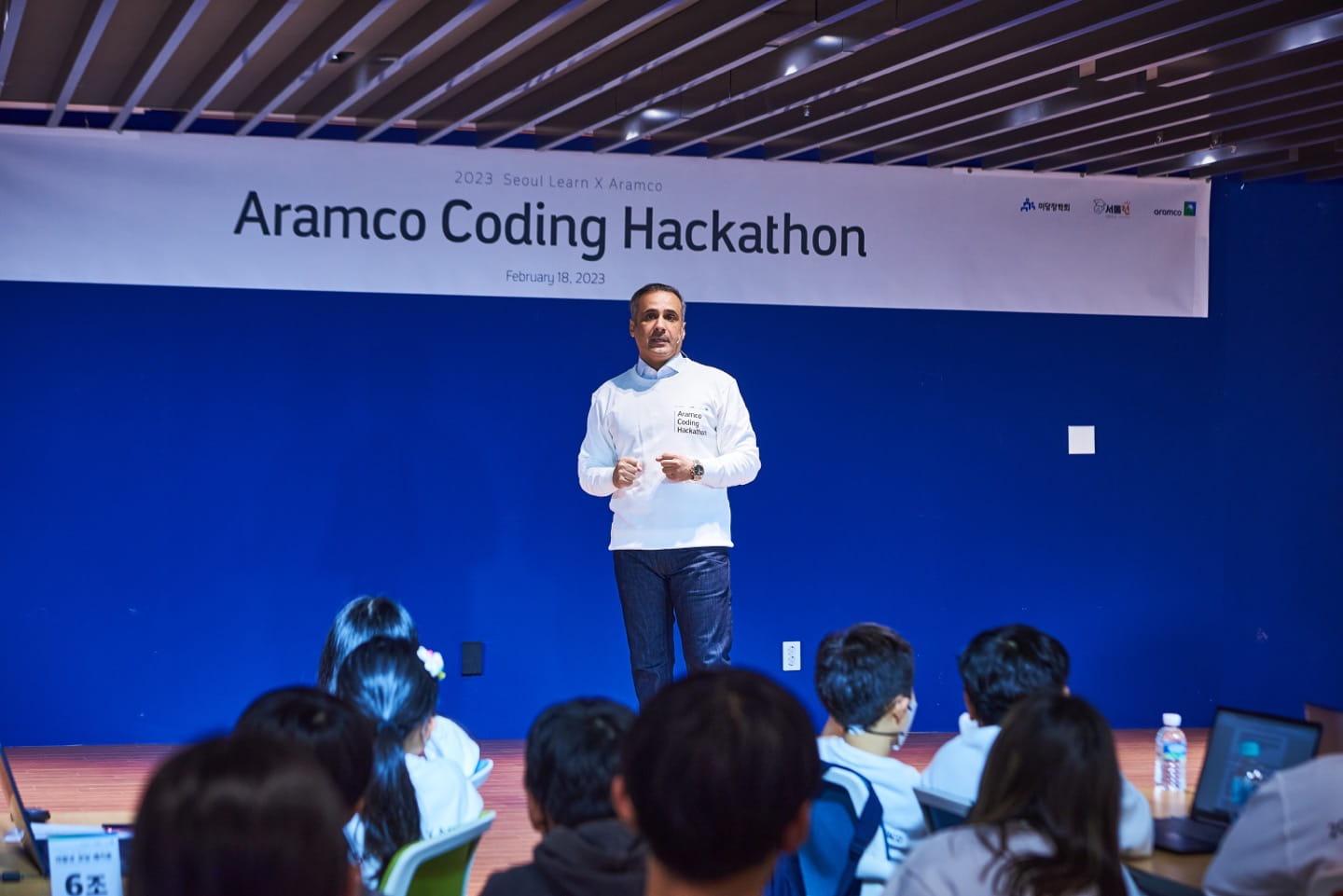Aramco Korea co-hosts Aramco Coding Hackathon with Seoul City and MIDAM

Aramco Korea Representative Director Mutib A. Al-Harbi was delivering the opening remarks at the Aramco Coding Hackathon on February 18 at Seoul Open City University's Southeast Campus.
-
Event aimed to tackle the digital divide and nurture ICT competencies for 500+ elementary and middle school students
-
Students were encouraged to develop solutions, using an open-source coding application, to address environmental issues including waste recycling and air pollution
-
Design Thinking1 and Un-plugged Coding activities2, along with mentoring sessions, were arranged to elevate students' interest in coding
-
The Aramco Coding World Cup, a nationwide coding competition, will take place in April
Aramco Korea, a fully-owned subsidiary of Aramco, one of the world's leading integrated energy and chemicals companies, announced that it held the Aramco Coding Hackathon, a nationwide coding competition, for Korea's elementary and middle school students in partnership with the Seoul Metropolitan Government and the MIDAM Scholarship Foundation.
The Aramco Coding Hackathon, held on February 18 at the Seoul Open City University's Southeast Campus, was implemented as part of the 'Seoul Learn X Aramco Coding School' education donation program, launched by Aramco Korea with the Seoul Metropolitan Government and MIDAM Scholarship Foundation in August 2022. The coding hackathon was designed with the aim of boosting students' interest and confidence in computer programming-based problem-solving skills and coding.
In April 2023, the Aramco Coding World Cup, a nationwide coding contest, is also scheduled to invite 500+ students to compete using their coding skills at the Dongdaemun Design Plaza in Seoul.
Students who joined the Aramco Coding Hackathon were grouped into teams consisting of five members and were given opportunities to design and develop computer applications to address environmental issues, including waste recycling and air and water pollution, by using Oven, an open-source application development tool. The awards were given to the highest-scoring teams who demonstrated excellent ideas for the given topics.
A variety of experience-based activities that are designed to raise students' interest in coding through play were also arranged. Part of the activities involved Un-plugged Coding, including 'Algorithm Yutnori3' and 'Shortest Path Finding4', and Design Thinking, including 'Making Chairs with Paper5' and the 'Marshmallow Challenge6'.
In his opening remarks at the event, Mutib A. Al-Harbi, Aramco Korea Representative Director, said: “At Aramco, we believe the real value of our work is in its potential to help people and communities thrive. We hope that you leave here with positive memories as well some additional skills that will serve you well in your coding journey.”
Aramco, the majority shareholder of S-OIL and the second-largest shareholder of Hyundai Oilbank, established Aramco Korea in 2012 to serve as a reliable energy supplier to Korea and to promote mutually beneficial business and technology partnerships with major Korean companies. Aramco Korea provides a wide range of educational and environmental awareness citizenship programs.
These programs include merit-based scholarships for university students with disabilities; supporting the installation of solar power generation systems at welfare facilities and fine dust precaution programs.
[1] Design Thinking: A non-linear and interactive process that teams use to understand users, challenge assumptions, redefine problems and create innovative solutions to the given challenges.
[2] Unplugged Coding: To teach coding concepts without using devices. It is learning how to code without writing lines of code. When coding unplugged, students use their knowledge to work on computational challenges that will help them understand the concepts they'll use in coding projects.
[3] Algorithm Yutnori: Unplugged activities to understand the concept of coding algorithms (sequence, repetition and selection) through play-oriented learning using the method of Yutnori, Korea's traditional board game.
[4] Shortest Path finding: Activities in which teams are given a starting point and an arrival point on the activity board, and the fastest route to the arrival point is found and expressed in an algorithm.
[5] Making Chairs with Paper: Activities to create chairs that can withstand the weight of team members using paper boxes, which are designed to develop chair design completeness and creativity, and team spirit.
[6] Marshmallow Challenge: Activities in which students make a tower by fixing spaghetti noodles with marshmallows, demonstrating the ability and creativity to coordinate opinions among team members. The team that makes the highest tower wins.
